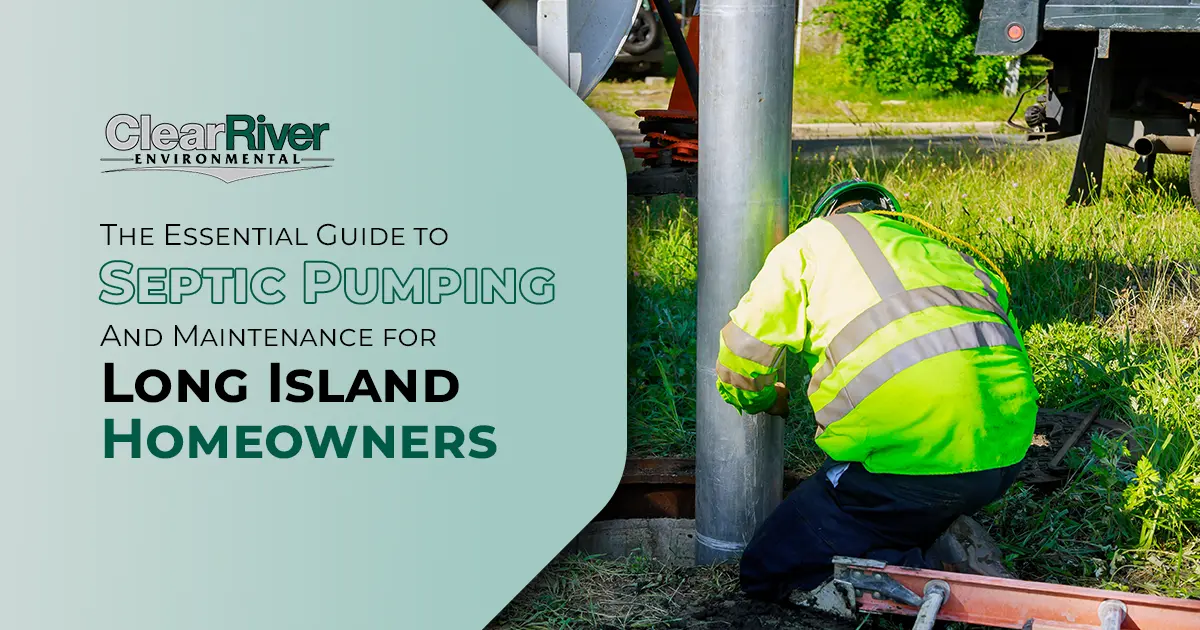The Essential Guide to Septic Pumping And Maintenance for Long Island Homeowners

According to a survey, over a million people still rely on conventional septic and cesspool systems for their wastewater treatment across Long Island. If you are one of them, this blog is really important for you.
It is equally important for residents and commercial properties not connected to a centralized sewer system to understand that proper waste treatment depends on regular septic system maintenance service. Neglecting the maintenance can damage the whole system, decrease the system’s lifespan, lead to costly repairs and in some cases, it may lead to replacing the whole system.
Here are some simple and easy tips – if followed carefully and regularly, they can prevent waste treatment system failures, avoid costly repairs and extend the life of your waste treatment systems:
In This Article
Educate everyone in the family
Since every member of the family uses the system, they should understand its importance and proper usage of the system. Educate every member of your family about how to use the system, what to flush down the toilet and what to keep away. Tell everyone to keep an eye on the entire system and immediately report if they notice anything unusual. The collective efforts decrease the septic system maintenance cost and improve the system efficiency.
What Not to Flush Down the Toilet
To know what to flush down the toilet and what to keep away, you must understand how does a septic system work. All the water from toilets, sinks and showers flows into the septic tank through a main pipe. The solids then settle to the bottom and liquids flow out into a drainfield. The solids break down naturally with the help of bacteria – some of them turn into gases and liquids and the rest remains in the tank. The drainfield lets the liquid slowly soak into the soil. The soil naturally filters and cleans it before it returns to the groundwater. When the septic tank is nearly full with solids, a septic pumping service is scheduled and the tank is cleaned.
Now that you understand how does a septic system work. You should only flush human waste and toilet paper into a septic system. Other things like wipes, grease, oil, chemicals, medicines, paper towels, feminine products, and food scraps should never go down the toilet. These items don’t break down properly and can clog pipes, damage the septic tank and kill the helpful bacteria needed to treat waste.
Septic System Inspection
Regular septic system inspection is mandatory to keep your system working well throughout its life. Walk around the system at least once a month and keep an eye on the entire septic and plumbing system. If you note any of the following symbols, just type “septic tank maintenance near me” and book a same day service with an expert technician:
More lush or dense grass near septic tank area than rest of the yard
Toilet drains slowly
noise in pipes after flushing toilet
Smell near the septic tank area
Sewage backup in toilet and sinks
Standing water near the septic tank lids or drainfield area
How Often to Pump Septic Tank
Regular septic tank pumps keep your system running smoothly for a long time. The frequency of the pumping and cleaning depends on the tank size and number of people using the system. On average, a septic tank should be pumped and cleaned once in 3 to 5 years to avoid system failures and costly repairs.
Remember! You must ask the technician for entire septic system inspection after pumping. This is the best time to check for any leak or other issues, as the system is empty.
Septic Leach Field Maintenance
Septic Leach field maintenance is also an important part of the septic system maintenance. This is the area where the liquid transfers to the soil. Although it’s safe to plant grass and occasionally park light vehicles on it, the area cannot handle heavy weight and frequent traffic. Therefore, make sure everyone is aware that parking heavy vehicles can cause serious damage. Additionally, avoid planting trees on or nearby this area as their roots may damage the pipes within the drainfield and even affect the septic tank.
If you do not know how to locate your septic tank and the drain field, call an expert septic technician to find your septic tank location.
Septic Tank Maintenance – Long Island
The soil of Long Island is sandy and porous, especially in Suffolk County. While this kind of soil usually drains the liquids well, which is helpful for the septic system. But it also means that liquids from the septic system move quickly into the ground and there is less time for natural filtration of the wastewater. This process increases the risk of contamination. Likewise, some parts of long island have shallow groundwater table, meaning that groundwater is closed to the surface and therefore, wastewater that is not fully treated may reach the drinking water resources.
Due to these risks, local governments enforce stricter septic rules and regulations. Some towns require upgrades to advanced treatment systems. Others like Suffolk County offers grants and incentives for replacing the old systems which can be availed with the help of septic tank maintenance companies.
Keeping in view the above situation of Long Island, it is extremely important for the Long Island residents to properly maintain their septic systems in order to protect their environment and drinking water. If you want to know if your septic system is environment friendly or want to upgrade to a new system, just click here and stay blessed.
Septic System Inspection Checklist
At the end here is a checklist you can use to keep track of the proper septic system and leach field maintenance:
Monthly:
Walk around the septic tank and leach field area to check for:
- Unusual odors
- Lush, green patches of grass
- Pooling/standing water
- Unusual noises from plumbing system
- Slow drains or toilets
Daily/Weekly Habits:
- Avoid flushing anything other than human waste and toilet paper
- Do not flush grease, oil, chemicals, or medicine down drains
- Use water efficiently to prevent overload
- Spread out laundry loads over the week
Property Care:
- Do not park heavy vehicles over the tank or leach field
- Do not plant trees or large shrubs near the system
- Maintain clear access to tank lids and covers
Every 1–3 Years:
- Hire a professional to inspect the septic or cesspool system
- Schedule pumping if needed (depending on tank size & household size)
- Inspect tank and pipes for cracks, leaks, or damage during pump-out
One-Time (or as needed):
- Locate and mark the septic tank and drain field areas
- Keep a record of all inspections, pumpings, and repairs
Print this checklist and place it at your convenient place so all members of your family are aware of everything regarding your septic system. Keep in mind that maintenance of your septic system is not a difficult job, a little awareness and regular care can help your system working well for a long time.
Need help with your system? Whether you want to locate your tank, schedule a pump-out, or upgrade to an advanced system, contact a licensed septic tank professional in Long Island today.

David Warren, Vice President and one of the founding visionaries of Clear River Environmental, brings
deep expertise in environmental stewardship, residential services, and operational leadership. Since cofounding the company, he has been instrumental in guiding Clear River’s evolution from a local cesspool service to Long Island’s leading provider of plumbing, septic, and environmental solutions, completing over 25,000 installations to date.
